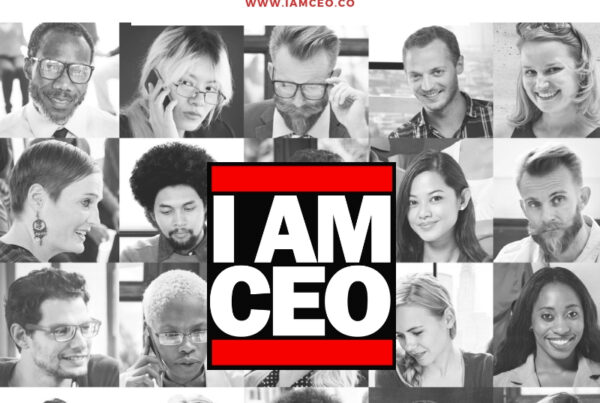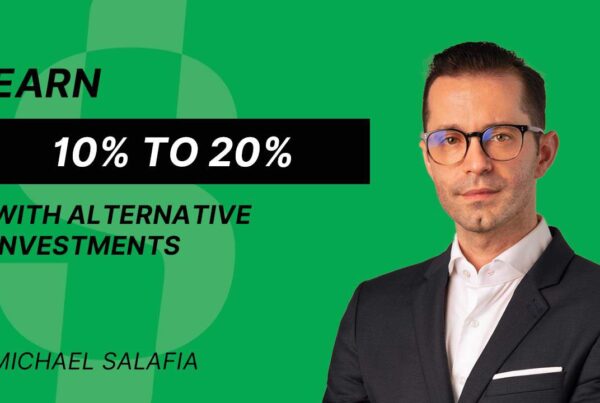Authority Magazine interview’s STAX Real Estate founder Michael Salafia about creating a successful career buying, rehabbing, and selling properties.
An Interview With Jason Hartman

Published in
Asa part of my series about the ‘5 Things You Need To Know To Create A Successful Career Buying, Rehabbing, and Selling Properties’, I had the pleasure of interviewing Michael Salafia.
Michael Salafia is the managing partner of Stax Equity, a next-generation private equity firm focusing on value-add single tenant net lease retail assets. Michael also serves as Director of Real Estate for SQRL Holdings, a multi-dimensional development program revolutionizing the convenience store industry through laser-precision-tactical service models. Prior, Michael was an award-winning member of Marcus & Millichap’s National Retail Group and National Net Leased Properties Group and spent nearly eleven years as the lead digital strategy advisor to an agency portfolio of Fortune 500 companies and national brands. While at CRE powerhouse Marcus & Millichap, Michael quickly became a top agent, connecting CRE investors with investment-grade NNN properties in high-growth metros leased to the strongest names in retail. Michael is a licensed real estate broker and holds an MBA from Northeastern University, with undergrad studies in Finance at NEU and Babson College, and post-grad workshops at Sloan MIT.
Thank you so much for doing this with us! Can you tell us the “backstory” about what brought you to the Commercial Real Estate industry?
Inone way, I was born into the commercial real estate industry. My family has owned and operated commercial real estate for over 100 years. When I was growing up, my parents and I actually lived above one of the retail stores that we owned. When I graduated college, it was in the midst of a financial crisis and complete collapse of the commercial real estate market so I decided to focus on technology. Through working as a consultant in the beginning of my career, I ended up working for some large commercial real estate developers, Real Estate Investment Trusts (REITs), and Moody’s Analytics CRE, a commercial real estate analytics platform. I had the opportunity to support CEOs in multibillion dollar development funds and work directly with the chief economist at Moody’s Analytics CRE, which led me to where I am today.
Can you share with our readers the most interesting or amusing story that occurred to you in your career so far? Can you share the lesson or take away you took out of that story?
What I have found most interesting in my career is learning the difference between the market perception of an individual investor and the person controlling the development and creating the deals. It’s interesting to see what a private investor thinks they know. First, what the reality is of the actual business operations and then monetization of the underlying real estate. There’s a big difference. Investors feel very confident based on certain factors, such as the credit of having a large corporation as a tenant, but they are not privileged to the reality of what’s going on behind the scenes in that large corporation. Just because it’s a large corporation does not mean you’re getting the highest quality of people supporting your property. It doesn’t mean that you’re going to get the highest quality of service. I think the boutique experience is often overlooked and discounted. An example would be thinking nothing could go wrong with a big publicly traded company. Yet in my experience, those are some of the most notorious companies who will come back to investors and they’ll play legal hardball. It’s important to learn the dark side of the big corporations and all the pitfalls that go with it. The industry is not as secure as some people think.
Do you have a favorite “life lesson quote”? Can you share a story or example of how that was relevant to you in your life?
“If you keep pressing hard enough you will gain traction and you can be successful doing that.” I came into this business with zero contacts. I worked the phones and kept calling people. So my motto is if you just keep pressing hard enough, you know what you’re doing, and make enough noise, you will gain traction.
Are you working on any exciting new projects now? How do you think that will help people?
Yes, STAX Equity is currently looking at acquiring a significant portion of a national gas station convenience store operator. Through this, we would acquire over 150 properties. Each one of those properties has at least two or three full time employees. So that’s over 450 jobs that we’d be protecting, and most of them are in rural markets where there’s not a lot of other jobs available.
What do you think makes your company stand out? Can you share a story?
We have a standardized set of data for the way we underwrite properties, and we will not deviate from our pattern. We have years under our belt of collecting clean sets of data that we can then go back and analyze to make real investment decisions. So we became our own source of proprietary market intelligence. And that truly sets us apart from any of our competitors. No one has our market intelligence. It’s only ours. At STAX Equity, we apply value add CRE investment strategy into the single tenant net leased asset class. Typically, as investors, you would not do that because there’s not enough margin. We’ve also identified hyper niche opportunities. Once the pandemic hit, there was a huge gold rush on essential retail, single tenant net leased assets. The most sought after assets were quick service restaurants, like fast food restaurants and drugstores. What I noticed is that many investors were overlooking the automotive sector. Everyone might have been stuck at home, but people were still driving a lot. Auto sales and auto service sales increased, while gasoline sales remained steady. There became this opportunity and I started looking at it for my clients. So there’s really a huge opportunity for growth if you can find underperforming assets, and then bring them up to speed by installing a better operator, which is much harder to do with fast food restaurants. It’s nearly impossible to do with drugstores. And the rest of the market is a little fragmented.
None of us are able to achieve success without some help along the way. Is there a particular person who you are grateful towards who helped get you to where you are? Can you share a story about that?
Lloyd Lynford, The CEO of REIS, the Real Estate Analytics Software company acquired by Moody’s. He explained to me their secret sauce and what it took to become the industry leader for market intelligence and commercial real estate. He drilled and instilled into my head that if you know the comps, that’s how you will know the market. He explained to me that for the past 30 years, he and his partners just picked up the phone and researched every single record at a county level, checking every single property transaction that closed, and then calling the agents, calling the principals and finding out the details. And it was creating a standardized set of data and committing to that standardized set of data over 30 years. That led to the success of growing REIS to what it is, which is now Moody’s Analytics CRE, notably the best and highest quality industry standard for commercial real estate data and intelligence. Now, that story really stuck with me. And as you know, I have a background in tech and development. So our whole platform at STAX Equity and how we’re able to go through so many properties so quickly and understand and scan the market and move at the velocity that we move and process as many deals as fast as we can. It’s because I stuck to that fundamental principle. I created a standardized set of data that I then developed an algorithm on top of in order to sort the properties and give us the critical information that we would need to make an offer and make an investment decision and create a business plan for a property.
You are a successful business leader. Which three character traits do you think were most instrumental to your success? Can you please share a story or example for each?
You must have a relentless drive. Just keep making calls. Keep getting out there. Keep talking to people. Keep studying, keep learning, and then take that back into your next conversation. I would make as many calls with purchasers as I could, as many calls with sellers as I possibly could. I run my team and set goals and keep pushing them and pushing them. But no matter what, every day you have to get in there and stick to the fundamentals. We find a buyer, we find the seller and we bridge the gap. We find an undervalued property, strategize our plan, deploy capital, and execute. The outcome is finding the buyer and bridging the gap, then exiting on the real estate. And we do this day in and day out. And it’s not easy. If it was easy, everybody would do it. It’s extremely lucrative, but it’s very challenging. It takes an incredible amount of mental endurance and persistence. Communication and sales skills are also extremely important. Every day, I am selling and talking to people. You must have the ability to speak in front of a boardroom. Lastly, having a tech background has been extremely important for me because the fact that I think like an engineer and a designer gives me an edge.
Ok. Thank you for all that. Let’s now jump to the main core of our interview. Can you share 3 things that most excite you about the Commercial Real Estate industry? If you can please share a story or example.
I am fascinated by urban planning. Something that makes me really excited about commercial real estate is just being involved with the development of physical infrastructure that people interact with and their everyday life. I am also a huge proponent of the convergence between ecommerce and brick and mortar traditional retail. Lastly, technology that is bridging the gap is extremely exciting, especially when it comes to sustainability. For example, powering retail stores using solar energy.
Can you share 3 things that most concern you about the industry? If you had the ability to implement 3 ways to reform or improve the industry, what would you suggest? Please share stories or examples if possible.
I’m concerned with Federal policies as they impact capital markets for commercial real estate investments. A solution could be bringing in more expert panels to listen to the experts and take action, because all the information and studies are out there. We need to set aside political agendas and create a more sustainable environment for lending on properties. Another concern I have pertains to labor laws. There should be more mentorship and visibility on salaries as professionals are breaking into the market. Lastly, I’m concerned with transparency. Unfortunately, there is a lot of deceptive advertising when it comes to showing properties. It would save everyone time, frustration, and make it a better marketplace to just be honest.
What advice would you give to other commercial real estate leaders to help their teams to thrive and to create a really fantastic work culture?
I would highly encourage everybody to start collaborating. There is so much technology and software out there that can help your team work together and strategize. You can use shared spreadsheets, Monday.com, Slack, Airtable, and etc. We all have access to these tools. Use them and modernize your practice with technology to benefit your team and clients. It will lead you to more success.

Ok, wonderful. Here is the main question of our interview. Can you please share with our readers your “5 Things You Need To Know To Create A Successful Career Buying, Rehabbing, and Selling Properties”? If you can, please give a story or an example for each?
Have a deep intimate understanding of your product type. The typical real estate investor like me will say know your market, inside and out. For example, I can underwrite the entire business of the gas station and convenience store. I understand all the intricacies of the fuel supply contract, the mechanics of the underground storage tanks. I know way more than I need to in order to actually just invest in the properties. By having all that knowledge, it gives me a huge competitive edge. So it’s really a deep, intimate understanding of the product type that you’re specializing in.
Know your market, know your comps. As you speak to investment buyers, sellers, and brokers within the marketplace, you’re going to get a lot of different opinions and information. If you want to be successful, you need to know what a property is worth. For example, If you focus on selling Taco Bell restaurants, you need to know your comps. If it’s in Florida, you need to understand the difference between the value of that Taco Bell in Orlando compared to West Palm Beach.
Be conservative with your forecasting. If you know your goal is to buy, rehabilitate, and then sell a property, and make money doing it, then when you’re writing your business plan, you need to make sure that your deal is profitable in the worst case scenario. There are a lot of factors that you may have zero control over like the Federal Reserve setting interest rates, for example, and how the market will react by a hurricane causing damages and then the business needs to shut down for a month. It’s very important with commercial real estate to be conservative of your valuations and your financial forecasting.
Always have a plan b, c, and d. Buyers are often misleading. Even if your buyer has a non refundable deposit, you still never know if they’re going to close until they sign that closing statement and transfer the money. If you’re buying a property and it seems like the deal is too good to be true, it probably is. Recently, my team dealt with having to spend time, money, and energy on moving a shipping container 1 foot from an encroachment line. You must account for everything.
You must have a relentless drive. That is non negotiable. There are going to be plenty of ups and downs, market cycles, day in and day out. Everyone who is successful is still taking meetings all of the time no matter how much business you may have.
What are the most common mistakes you have seen other people make when they try their own hand at commercial real estate flipping? Can you share any stories?
The biggest mistake people will make is not accounting for shifts in the market and how long it’s going to take to execute on your investment strategy. For example, I had a client go in and it was the absolute peak of the market. Interest rates were at an all time low. Cap rates were at an all time low prices were at an all time high. We found what looks like at the time in that in those market conditions to be an incredible deal, where we had a national tenant and we were going to basically renovate the property and extend the lease with the tenant. On paper everything looked great, except for where the property was located. So in all reality, if it didn’t work with this tenant we would be in a very bad position. We wrote this business plan to execute within a four month timeframe. It ended up taking us months, four months just to acquire the property because the seller dragged out the deal. And by the time we acquired it, within a month, the market had shifted because the Federal Reserve changed interest rates and it didn’t work out with the tenant. They decided they did not want to extend their lease. If the market hadn’t shifted, we still could have gotten out of the deal and made some money but this investor did not account for what happens if the market shifts. And that brings me to my point earlier that you have to be conservative in your underwriting. Your biggest pitfall is going to think you know the market and then another cycle hits.
From your experience, what can be done to avoid those errors?
Be conservative in your financial forecasting. Have a backup plan. Make sure you can break even and not take a loss. Make sure if market shifts or things don’t work out the way you think, you will at least get your money out of the deal, break even, and not take a loss.
You are a person of great influence. If you could inspire a movement that would bring the most amount of good to the greatest amount of people, what would that be? You never know what your idea can trigger. 🙂
I would inspire a movement of extreme ownership. For me, that’s what it comes down to. You can’t go to the past, you’re not yet in the future. All you have is the present and all you can control is what you can do now. If you take ownership every day over what you can do, and stay focused on the present, the future will keep improving and your past will keep getting nicer. It’s the mindset of what am I doing to inspire my team to work harder? I think if more people thought that way the world would be a better place.
How can our readers further follow your work online?
Connect with me on Linkedin and twitter!
Thank you for your time, and your excellent insights! We wish you continued success.



